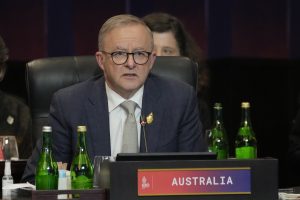In the last few years, the costs and impacts of climate change have become unavoidably clear to Australians. In the summer of 2019-2020, the country saw one of its worst bushfire seasons and in 2021-2022 devastating flooding filled headlines. In an editorial endorsing the Labor Party’s bid for government earlier this year, The Age wrote that “a change of government is needed to begin restoring integrity to federal politics and … face up to the challenge of climate change.”
Sure enough, Australia’s federal election in May 2022 saw the incumbent Liberal/National Coalition – then led by Prime Minister Scott Morrison – fail to secure a fourth consecutive term. Instead, for the first time since 2007 the Labor Party, led by Anthony Albanese, achieved a majority government. Across Australia, voters swung away from the Liberal Party’s coalition, switching their votes to Labor or “teal independents” for whom climate change is a critical issue.
Months later, the Labor government has maneuvered Australia toward becoming a more responsible global power when it comes to climate change. The road ahead isn’t easy, particularly given Australia’s significant coal industry. But, as Dr. Robert Glasser explains in the interview below, Labor has positioned itself well politically to pursue an ambitious climate agenda.
Glasser, head of the Climate and Security Policy Centre at the Australian Strategic Policy Institute, spoke to The Diplomat’s Cathrine Putz about the role of climate change in Australia’s modern politics.
What impact did the issue of climate change have in the Australian Federal election in May?
Climate change had an enormous impact in the Australian Federal election. Indeed, it was called the “climate election” by many. Labor campaigned on a platform of more ambitious climate action, and it was a major factor in the swing against Scott Morrison’s conservative coalition.
The changes in rhetoric and action on climate change since Labor’s election victory have been striking. The government has enshrined a more ambitious climate target – reducing greenhouse gases by 43 percent by 2030 – in legislation. It has produced the nation’s first climate and security risk assessment and initiated a process across government to develop a major strategy to strengthen national resilience to climate impacts.

































